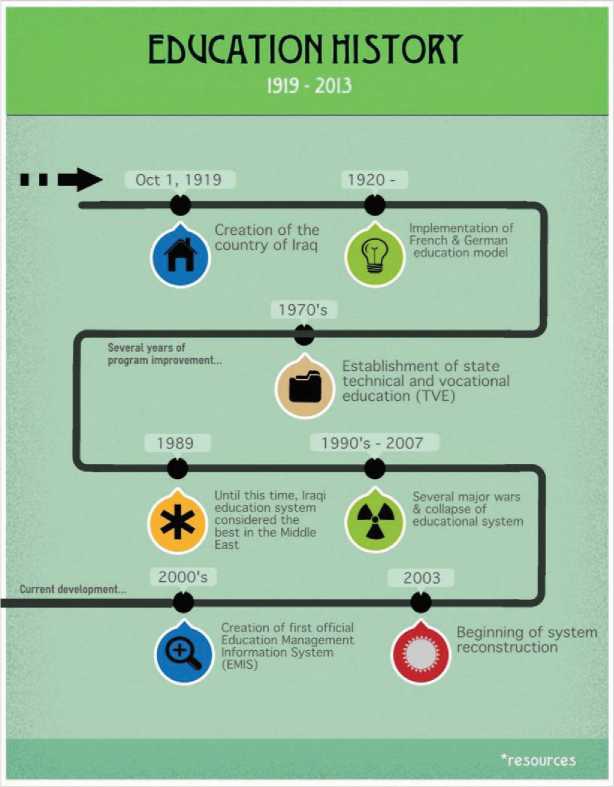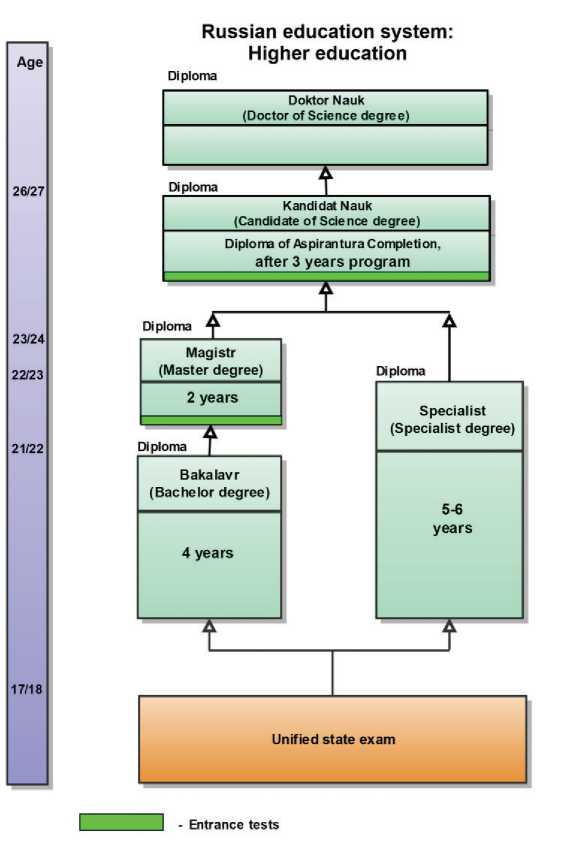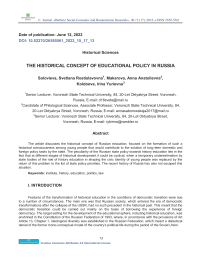The historical concept of educational policy in Russia
Автор: Solovieva Svetlana Rostislavovna, Makarova Anna Anatolievna, Kolobova Irina Yurievna
Журнал: Bulletin Social-Economic and Humanitarian Research @bulletensocial
Статья в выпуске: 15 (17), 2022 года.
Бесплатный доступ
The article discusses the historical concept of Russian education, focused on the formation of such a historical consciousness among young people that would contribute to the solution of long-term domestic and foreign policy tasks by the state. The peculiarity of the Russian state policy towards history education lies in the fact that at different stages of historical development it could be cyclical, when a temporary underestimation by state bodies of the role of history education in shaping the civic identity of young people was replaced by the return of this problem to the list of state policy priorities. The recent history of Russia has also not escaped this situation.
Institute, history, education, politics, law
Короткий адрес: https://sciup.org/14123819
IDR: 14123819 | DOI: 10.52270/26585561_2022_15_17_13
Текст научной статьи The historical concept of educational policy in Russia
Features of the transformation of historical education in the conditions of democratic transition were due to a number of circumstances. The main one was that Russian society, which entered the era of democratic transformations after the collapse of the USSR, had no such precedent in the historical past. This meant that the democratic transition could be carried out mainly on the basis of borrowing the experience of foreign democracy. The target setting for the development of the educational sphere, including historical education, was enshrined in the Constitution of the Russian Federation of 1993, where, in accordance with the provisions of Art Article 13, Chapter 1, ideological diversity was established in the Russian Federation, which meant a dialectical denial of the former mono-conceptual model of the country's political life during the period of the Soviet Union.
Despite the constitutionally enshrined principle of de-ideologization and democratization, which regulates the main spheres of public life in post-Soviet Russia, liberal democratic values actually dominated here, serving as the conceptual basis for the transition to market relations. These values primarily included: the priority of personal rights and freedoms; formal legal equality of citizens as subjects of rights and obligations; fetishization of individualism in its various manifestations; the cult of success in life as a meaning-forming goal of personal behavior, the achievement of which presupposes readiness and ability for tough interpersonal competition.
II. METHODOLOGY
The methodological basis of the study was the provisions of the systemic approach in combination with the genetic and comparative-historical approaches, which determined the consideration of the process of growth of the systemic properties of diagnostic and ideological thought and activity in the course of their evolution in the structure of pedagogical systems; civilizational, formational, cultural, interdisciplinary approaches; principles of reliance on the achievements of theory and practice, mutual complementation of facts, theories, technologies; provisions on the relationship between the individual's consciousness and his activity, the dialectical relationship between the level of development of pedagogical culture and diagnostic activity; the principle of historicism, which requires considering the phenomena under study in their formation and development; the principle of pluralism, which implies the historical significance of the diversity of cultural forms.
III. DISCUSSION AND RESULTS
The analysis of the scientific literature on the problem under study showed that the study of various aspects of state policy in the organization of national historical education was carried out by representatives of a number of humanities - primarily history, sociology, political science - which is justified by the complex nature of the problem under study. At the same time, the analysis of scientific literature showed that, in comparison with representatives of other sciences, this problem has not yet become a priority for historians.
A special place among historical works is occupied by works devoted to the specifics of the activities of various state institutions in the formation of historical consciousness, its role and place in the behavioral practice of the younger generation. Here, first of all, it is necessary to highlight the studies of O.S. Gorkunova, I.V. Kutykova, O.B. Leontieva, Yu.A. Levada, V.V. Lykova, L.N. Mazur, I.B. Orlova, I.M. Savelieva, A.B. Poletaeva, E.A. Protaseni, L.P. Repina, Zh.T. Toshchenko, N.G. Fedorova.
The study of the development of higher historical education in the educational space of Russia allows us to conclude that higher historical education, as a social institution at all stages of its development, was an integral part of the socio-political system that predetermined its goals; set tasks, transformed the structure and set the content of historical courses. The political factor in the development of higher historical education almost always prevailed over the needs of the individual, economy or society. But at the same time, higher historical education also had its own internal history - the history of its constituent people, who differently perceived the requirements of the socio-political system, modified or adapted to it, filled the structure of the state system of training historians with their feelings, values, worldviews.
The historical reality in modern social and humanitarian research involves the expansion of the subject area through the use of interdisciplinarity, such a synthesis of the sciences of man and society, which makes it possible to implement the introduction of "horizontal" and "vertical" links into the historical process, to consider a comprehensive analysis of the subjective and objective, micro and macrostructures, etc.
The modern study of the problems of education, which can be considered as a sphere of interaction of various factors - economic and political, social and cultural, anthropogenic and epistemological, in our opinion, is the most acceptable and productive from the standpoint of "new social" and "sociocultural history".
With such a research orientation, the evolutionary dynamics of the national education system is considered not so much in the traditional context of identifying the essence of the main directions and features of educational policy, the organizational structure of this system, the transformation of scientific and cognitive paradigms, but from the point of view of the interaction of various participants and factors of the educational process.
The system of education in general, and historical in particular, is viewed through the prism of the organic unity of the types of sociality and culture in the sociocultural approach. Education as a phenomenon of culture in the spiritual-content, morphological and organizational-institutional aspects, on the one hand, forms a "culture in a person", fills human activity with meaning, on the other hand, creates such an educational environment that creates the necessary conditions for its self-development. With all the variety of approaches to studying the phenomenon of education, the most optimal, in our opinion, is the understanding of higher education as a specific socio-cultural institution that has emerged and is developing in accordance with changing social interests and needs. As a result of this understanding, the focus of research attention should be on the processes of origin, institutionalization, reform of this sphere, socialization of the individual, the relationship of higher education with economics, politics, determining the place in the system of social management, etc. Higher education as an element of the social system has a dual purpose: to meet the social needs of the subjects of highly skilled labor activity and to meet individual needs for knowledge, skills and abilities. The main functions of higher education include: providing and reproducing the highest level of intellectual resources of a certain society; transmission and dissemination of culture; generation of new knowledge, ideas, etc.

The transformation of the higher education system is the product of the impact of various factors - from economic to administrative and organizational, in other words, the interaction of a set of development factors, the educational system can be considered as an "educational space", in the center of which is a person focused on achieving a certain social status within the framework of values formed in a particular society.
Higher historical education is a complex systemic education that includes a number of elements: state policy in this area; the educational situation in a certain period, which is characterized by the interaction of economic, sociocultural and other factors; the dominant type of scientific outlook and methodology of scientific research; value orientations and practical activities of subjects of education; changing organizational institutions and forms of historical education; assessment of the quality of training of specialists, etc.
Revealing the structure of higher historical education allows, applying an interdisciplinary approach to its study, to determine the main directions, trends and features of the development of education in the period under study.

The potential of higher historical education as a means of state ideology in the 1920s was still little perceived by the party corporation headed by V.I. Lenin, A.B. Lunacharsky, N.K. Krupskaya, etc.
Solving the primary tasks of "reforging" the pre-revolutionary views of historians, reworking the structure of "bourgeois" universities, "democratizing" historical knowledge, the reform measures of the Soviet government broke the methods, forms and techniques of the system of obtaining and teaching historical knowledge that had been formed for a century before the revolution. Already in the early 1920s the historical and philological faculties of universities ceased to exist, since the middle of this decade, the history of Russia has disappeared as a subject for many years, at the end of the 1920s - history as an academic discipline: the discipline was excluded from the plans of secondary schools.
The destruction of the cadres - the "old professorship" of historians during this period finally undermined the potential of the few remaining historical departments within the institutes. As a result, by the turn of 1934, when a decision was made in party circles to restore history at school and at university, higher historical education had practically lost both its methodological foundations and, to a large extent, its personnel potential.
IV. CONCLUSION
The dynamism of modern civilization and the contradictory nature of the transition to an information society significantly change the nature and social functions of historical education. It becomes obvious that higher education provides not only professional training and reproduction of an integral socio-cultural heritage, but also is a resource for the transformation of the system of social ties, human qualities and capabilities. At the latest stage of modernization, the creative and innovative function of education is steadily gaining strength. Being the subject and at the same time the object of a whole complex of political and economic transformations of Russian society, higher historical education can become a social force capable of influencing the formation of the most demanded human qualities in the new socio-cultural situation: among which are high mobility, competitiveness and civic responsibility.
Список литературы The historical concept of educational policy in Russia
- Boldyreva E.P. Nekotorye aspekty vliyaniya sovremennoj politicheskoj situacii na rossijskoe obrazovanie. Nauka i obshchestvo. 2015. Vol. 1 (20). S. 132-134.
- Bykov A. K. Formirovanie istoricheskogo soznaniya kak prioritetnaya zadacha patrioticheskogo vospitaniya molodezhi. Molodezh' i obshchestvo (patrioticheskoe vospitanie molodezhi). 2012. Vol. 1. S. 78-86.
- Dubrovskij A.M. Istorik i vlast'. Istoricheskaya nauka v SSSR i koncepciya istorii feodal'noj Rossii v kontekste politiki i ideologii (30-e50-e gg.). Bryansk, 2005. 800 s.
- Ershov B., Novikov Yu.N., Voytovich D., Ermilova O., Dushkin O., Lubkin Y. Physical culture in formation of spiritual education of young people in Russia. The European Proceedings of Social & Behavioural Sciences EpSBS. 2019. S. 3648-3653.
- Ershov B.A., Nebolsin V.A., Solovieva S.R. Higher education in technical universities of Russia. 7th International conference on education and social sciences. Abstracts & Proceedings. 2020. S. 55-58.
- Ershov B.A., Perepelitsyn A., Glazkov E., Volkov I., Volkov S. Church and state in Russia: management issues. 5th International conference on advences in education and social sciences. Abstracts & Proceedings, epublication. 2019. S. 26-29.
- Ershov B.A., Zhdanova T.A., Kashirsky S.N., Monko T. Education in the university as an important factor in the socialization of students in Russia. 6th International Conference on Advances in Education. Abstracts & Proceedings. 2020. S. 517-520.
- Gordina E.D. Istoriko-patrioticheskoe vospitanie v gody Velikoj Otechestvennoj vojny. Voprosy istorii (soobshcheniya). 2011. Vol. 12. S. 58-71.
- Ioffe A.N. Sovremennye vyzovy i riski razvitiya grazhdanskogo obrazovaniya v Rossii. Prepodavanie istorii i obshchestvoznaniya v shkole. 2006. Vol. 29. S. 19-24.
- Kislyagina L.G. Formirovanie obshchestvenno-politicheskih vzglyadov N.M. Karamzina (1785-1803 gg.). M., 1976. 198 s.
- Korotkih I.A. Teoriya fizicheskogo vospitaniya studentov: Uchebnoe posobie dlya studentov ped. vuzov. Kemerovo, 1998. 124 s.
- Marchuk V.A. Psihofiziologicheskie harakteristiki umstvennogo truda studentov. Fizicheskaya kul'tura I sport: integraciya nauki i praktiki: materialy II mezhdunarodnoj nauchno-prakticheskoj konferencii. Stavropol', 2005. S. 156-159.
- Savel'eva I.M., Poletaev A.B. Social'nye predstavleniya o proshlom: tipy i mekhanizmy formirovaniya. M.: VSHE, 2004. 55 s.
- Shcherbatyh YU.V. Ekzamen i zdorov'e. Vysshee obrazovanie v Rossii. 2000. Vol. 3. S. 53-56.
- Slyusarenko I. O., Ershov B. A. Spiritual and moral education and education in the field of global problems of modernity. In the collection: Russia and the world at a new stage of global competition. materials of the International Scientific and Practical Student Conference. 2013. S. 247-249.
- Tihomirov L.A. CHto takoe nacionalizm. Moskovskie vedomosti. 1910. Vol. 2. 174 s.
- Volodina T.A. Uvarovskaya triada i uchebniki po russkoj istorii. Voprosy istorii. 2004. Vol. 2. S. 117-128.
- Vyazemskij E.E., Strelova O.YU., Ukolova V.I. Istoriya dlya zavtrashnego dnya (sovremennaya reforma shkol'nogo istoricheskogo obrazovaniya v Rossii). M., 1999. 186 s.
- Zankov L.V. Obuchenie i razvitie (eksperimental'no-pedagogicheskoe issledovanie). Izbrannye pedagogicheskie trudy. M.: Dom pedagogiki, 1999. 606 s.


